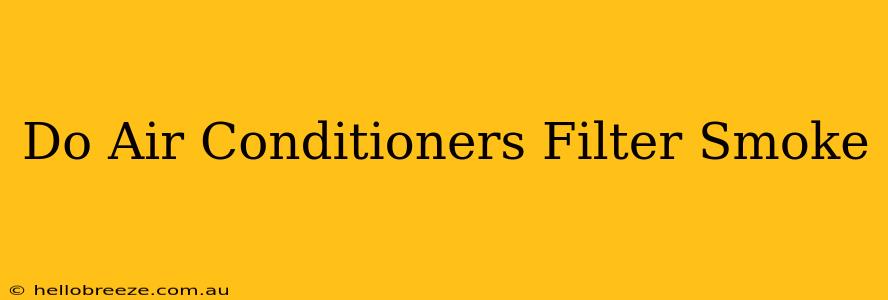Do Air Conditioners Filter Smoke? A Comprehensive Guide
Wildfires, industrial accidents, and even controlled burns can fill the air with smoke, impacting air quality and raising concerns about indoor air safety. Many people wonder: Do air conditioners filter smoke? The short answer is: it's complicated. While air conditioners can help to some extent, they aren't designed as dedicated smoke filters and their effectiveness depends on several factors.
How Air Conditioners Work and Their Impact on Smoke
Air conditioners work by circulating air, cooling it through a refrigerant process, and then blowing the cooled air back into a room. This process does involve pulling air from the outside, filtering it to a degree, and then recirculating it. However, the filters used in typical air conditioners aren't designed to capture microscopic smoke particles effectively.
Standard air conditioner filters: These are typically designed to remove larger particles like dust and pollen. They are not designed to capture the tiny particulate matter (PM2.5 and PM10) that makes up smoke. These particles are far smaller and can easily pass through standard filters.
HEPA filters: High-Efficiency Particulate Air (HEPA) filters are much more effective at capturing smaller particles, including smoke. However, they are not standard in most home air conditioners. Some high-end models might offer HEPA filters as an upgrade or optional addition, but this is not the norm.
Factors Affecting an Air Conditioner's Ability to Filter Smoke
Several factors influence how well (or poorly) your air conditioner handles smoke:
-
Filter type and quality: As mentioned, the type of filter is crucial. A standard filter will provide minimal protection against smoke, while a HEPA filter will be much more effective. Even with a HEPA filter, the effectiveness will be limited by its size and the concentration of smoke particles.
-
Air conditioner type: Window units, portable units, and central air conditioning systems all work differently and have varying levels of filtration capabilities. Central air systems, due to their larger capacity, might offer more filtration potential if equipped with a high-quality filter.
-
Smoke concentration: The amount of smoke in the air drastically impacts filtration. In cases of heavy smoke, even a HEPA filter may struggle to completely clean the air.
-
Air circulation: How well your air conditioner circulates the air in your space also plays a role. Proper air circulation will help to filter more air, even if the filter's effectiveness is limited.
What to Do During Smoky Conditions
Relying solely on your air conditioner to protect you from smoke is not advisable. Here's what you should do:
-
Upgrade to a HEPA filter: If possible, consider upgrading your air conditioner filter to a HEPA filter, especially if you live in an area prone to wildfires or poor air quality.
-
Use an air purifier: Air purifiers, particularly those with HEPA filters, are specifically designed to remove smoke particles from the air. These are a far more effective solution than relying solely on your air conditioner.
-
Seal windows and doors: Keep your windows and doors sealed to prevent outside smoke from entering your home.
-
Monitor air quality: Pay attention to air quality reports and follow any advisories issued by local authorities.
In Conclusion: While your air conditioner might offer some level of protection against smoke, it's not a reliable or effective solution on its own. To ensure cleaner, safer indoor air during smoky conditions, consider investing in a dedicated air purifier with a HEPA filter and take other necessary precautions. Don't rely on your AC alone to protect you from the harmful effects of smoke inhalation.

